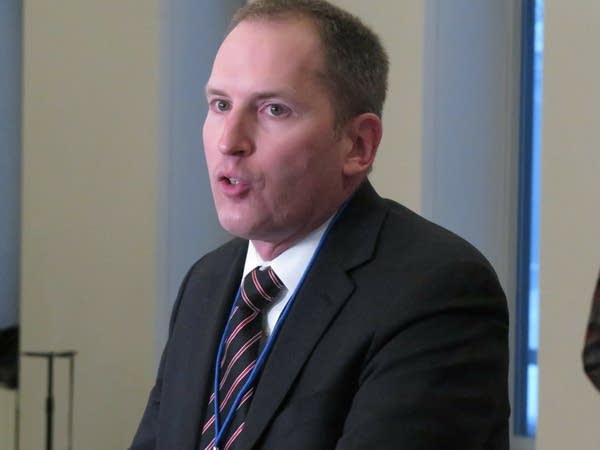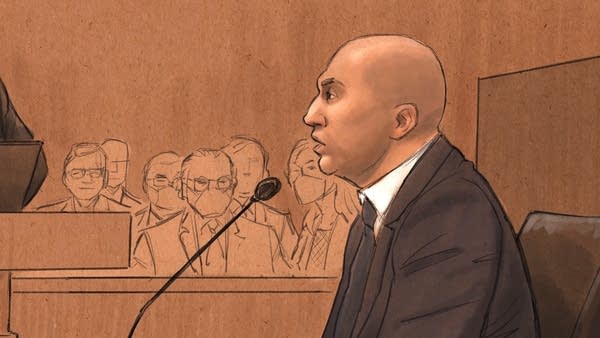George Floyd killing: Federal jury finds 3 ex-cops guilty on all counts

Go Deeper.
Create an account or log in to save stories.
Like this?
Thanks for liking this story! We have added it to a list of your favorite stories.
Updated 5:45 p.m.
Three fired Minneapolis police officers were found guilty Thursday on all counts of violating George Floyd's civil rights.
Thomas Lane, J. Alexander Kueng and Tou Thao were on the scene of Floyd’s arrest May 25, 2020, as Derek Chauvin, the senior officer on site, pressed his knee into Floyd’s neck for more than nine minutes while Floyd, handcuffed and face down on the pavement, pleaded that he couldn’t breathe and died in police custody.
Thao, Kueng and Lane were convicted of failing to provide medical aid to Floyd.
Kueng and Thao were also found guilty of the criminal civil rights charge of failing to intervene to stop Chauvin, who was found guilty in April on state charges of murder and manslaughter in Floyd’s killing and later pleaded guilty to the federal charge of violating Floyd’s civil rights.
Turn Up Your Support
MPR News helps you turn down the noise and build shared understanding. Turn up your support for this public resource and keep trusted journalism accessible to all.

Reactions in the federal courtroom in St. Paul were mostly muted as the verdicts came down. Lane and his attorney looked frustrated, both shaking their heads.
The three ex-officers were not taken into custody immediately. Judge Paul Magnuson continued their bond, so they’ll be out at least until sentencing. The court hasn’t yet set a date.
The three men also face state charges of aiding and abetting murder and manslaughter. That trial is scheduled for June.
Floyd’s killing sparked outrage and protests across the country and unrest in the Twin Cities after bystander video of the scene was posted online.

“These officers had a moral responsibility, a legal obligation and a duty to intervene, and by failing to do so, they committed a crime,” Acting United States Attorney Charles Kovats told reporters following the verdicts.
Philonese Floyd, George’s brother, called it a good day but still a sad one. “This is just accountability,” he said of the convictions. “It can never be justice because I can never get George back. I can’t get my brother back.”

He called on Congress to pass a package of changes in policing in George Floyd’s name.
569 seconds
The case went to jurors Wednesday. They worked through Thursday before coming to a verdict.
In closing statements Tuesday, prosecutor Manda Sertich told the court the three ex-cops disregarded their training and duty to intervene to stop Chauvin’s unreasonable use of force to subdue Floyd. Officers were attempting to arrest him for allegedly using a counterfeit $20 at the Cup Foods store in south Minneapolis.
Sertich, an assistant U.S. attorney, told jurors the defendants did nothing to help Floyd, "contrary to their training, contrary to common sense and contrary to basic human dignity."
She repeated the law enforcement mantra: “In your custody. In your care.”
Starting with Thao, Sertich said he ridiculed bystanders who were pleading with the officers to let Floyd up and provide him with medical aid.

"He would argue with and belittle the people trying to make him do what the law, not to mention human decency and common sense, required him to do," Sertich said.
Sertich told jurors that Thao and his co-defendant watched for 569 seconds as Chauvin “pressed the life” out of Floyd. She said both men were close enough to tap Chauvin on the shoulder and tell him that Floyd needed to be moved, but neither one did.
Kueng pressed Floyd’s handcuffed wrists into his lower back, casually picked gravel out of a squad tire and laughed with Chauvin when he told Floyd that talking uses lots of oxygen, Sertich said. Kueng described it during his testimony as a “moment of levity.”

Lane asked twice whether Floyd should be turned on his side to breathe, but Chauvin and Kueng both said to leave him.
"Even though [Lane] recognized and even gave voice to the mortal danger George Floyd was in, he did nothing to give George Floyd the medical aid he knew that Mr. Floyd so desperately needed," Sertich told jurors. "When the need was the greatest, he did the least.”
Sertich said it was clear even to the bystanders that Floyd needed urgent medical aid.
“They knew these officers they were watching had more power than they did, more authority than they did," and they still stood up for Mr. Floyd,” Sertich told jurors. “In this country we're not prohibited from questioning the police and other public officials. Each citizen has the right to do so. No one is above the law."

The officers' failure to act led to Floyd’s “slow and torturous death,” in public, she added. "They chose not to intervene, they chose not to aid George Floyd as the window to save Mr. Floyd’s life slammed shut,” Sertich ended her argument. “This is a crime."
All three defendants testified in their own defense during the trial.
Jurors at the trial appeared to be all white, with four men and eight women. Magnuson ordered their identities be kept secret for 10 years. His order doesn't prevent jurors from speaking about the trial after it concludes.
‘Tragedy is not a crime’
Thao’s attorney Robert Paule said Floyd's death was a "tragedy,' but "a tragedy is not a crime." Paule said that his client did not fail to act out of the legal element of willfulness, "which means a bad purpose or an improper motive.”
Instead, Paule said, the officers thought Floyd was showing symptoms of “excited delirium,” a controversial syndrome that many first responders are trained to recognize. He said the officers were waiting for the ambulance to arrive so Floyd could receive better treatment from paramedics.
Defense attorney Thomas Plunkett described his client Kueng as a young “idealist from north Minneapolis" and told jurors Kueng was not criminally liable because he received inadequate training, lacked experience, perceived a subordinate role to Chauvin and had confidence in the senior officers at the scene.
Plunkett told jurors that paramedics chose to go a couple blocks away to treat Floyd because “the crowd was hostile.”
Defense attorney Earl Gray, who is representing Lane, partly blamed "mob rule and politics" for the government prosecution of the former officers.
"Every reasonable person should just be disgusted,” Gray told jurors. "It’s sort of scary. You can do an innocent act. You can end up in a courtroom like this."
Gray said Lane and Kueng didn't bash Floyd over the head when they were initially detaining him, but were “wrestling” with him, and that Lane followed his training in calling for an ambulance, and then later assisted a paramedic with CPR.
“They’re trying to be cooperative police officers, to cooperate with the arrestee,” Gray told jurors. They’re trying to de-escalate the situation."
In the prosecution rebuttal, Assistant U.S. Attorney LeeAnn Bell said force used by police officers has to be proportionate and reasonable, and that officers who can't find a pulse on wrist can either get up and check neck pulse or start CPR.
"It's not reasonable,” she said, “not to do anything.”
Watch reactions from George Floyd’s family and federal prosecutors Thursday after the verdicts were read:


